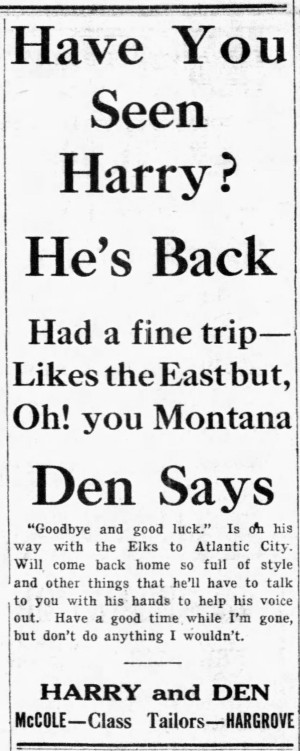Of American-English origin, the phrase don’t do anything (that) I wouldn’t (do), used upon parting, and often jocularly, means behave yourself. The speaker remains vague as to the nature of the doings that the listener is to avoid engaging in.
These are the earliest occurrences of the phrase that I have found, in chronological order:
1-: From this advertisement, published in the Great Falls Daily Tribune (Great Falls, Montana) of Friday 7th July 1911 and following days:
Have You
Seen
Harry?
He’s Back
Had a fine trip—
Likes the East but,
Oh! you Montana
Den Says“Goodbye and good luck.” Is on his way with the Elks to Atlantic City. Will come back home so full of style and other things that he’ll have to talk to you with his hands to help his voice out. Have a good time while I’m gone, but don’t do anything I wouldn’t.
HARRY and DEN
McCOLE—Class Tailors—HARGROVE
2-: From the conclusion of A Shopper’s Letter, in which a woman signing herself ‘E. J.’ gives fashion-shopping advice to ‘Anne’—published in The Kansas City Star (Kansas City, Missouri) of Thursday 12th March 1914:
Good-by for this time. Don’t do anything I wouldn’t.
3-: From The Illinois State Journal (Springfield, Illinois) of Friday 8th May 1914 (L. & N. is the abbreviation of Louisville and Nashville Railroad):
At the best attended and one of the most enthusiastic meetings of the Tri-State Traveling Passengers association since its organization four years ago, one hundred and twenty-five Passenger agents held their annual election and banquet yesterday in the St. Nicholas hotel.
[…]
[…] The affair was brought to a conclusion at an elaborate banquet in the evening in the parlors of the St. Nicholas hotel, to which ten general passenger agents, and the balance, other representatives of lines in Illinois, Indiana and Missouri sat down. Charles Fitzgerald, of the L. & N. at St. Louis, acted as toastmaster.
[…]
[…] The agents departed to their homes, with the admonition of Toastmaster Fitzgerald, to behave themselves “with decorum and don’t do anything I wouldn’t do.”
4-: From The Seattle Daily Times (Seattle, Washington) of Sunday 16th April 1916:
Rev. W. A. Major, for twenty-five years pastor of Bethany Presbyterian Church, and now superintendent of field work for this district is much perturbed. He fears the race is advancing more rapidly than he; that the race is to the swift and that relegation to the preachers’ scrap pile is approaching. To explain.
Last night the jovial divine—incidentally one of the best of Seattle’s after dinner speakers—was returning from a West Seattle revival service. While waiting for a Broadway car he encountered some of the young folks of his former flock and orated thusly to a friend afterward:
“I’m a back number. Either humanity is traveling too fast for me or I don’t understand the English language any more. I met some young people just now, and in conversation with them I used my time-worn phrase, ‘It’s a great life, isn’t it?’ to which a demure young damsel replied:
“‘You bet it is—if you don’t weaken.’
[…]
“Then, when I left, another piped up cheerily:
“‘Nighty-night, fair sir. Don’t do anything I wouldn’t do. That holds you down pretty tight, but the straight-and-narrow’s the real air-line after all.’
“I gasped once, said goodnight—and here I am. It’s a great life if you don’t weaken.”
5-: From the letter that a soldier named Charles Ruble wrote on Sunday 7th October 1917, from Camp Doniphan, Fort Still, Oklahoma, to a “dear pal” of his—letter published in Letters From Our Soldiers, in The Great Bend Tribune (Great Bend, Kansas) of Thursday 11th October 1917:
I suppose that you are enjoying your school this year. Be a nice boy and don’t do anything that I wouldn’t.
6-: The phrase soon became hackneyed—as mentioned in one of the unconnected paragraphs making up the column Globe Sights, published in The Atchison Daily Globe (Atchison, Kansas) of Wednesday 22nd May 1918:
A most tiresome modern saying: “Now don’t do anything I wouldn’t do.”

